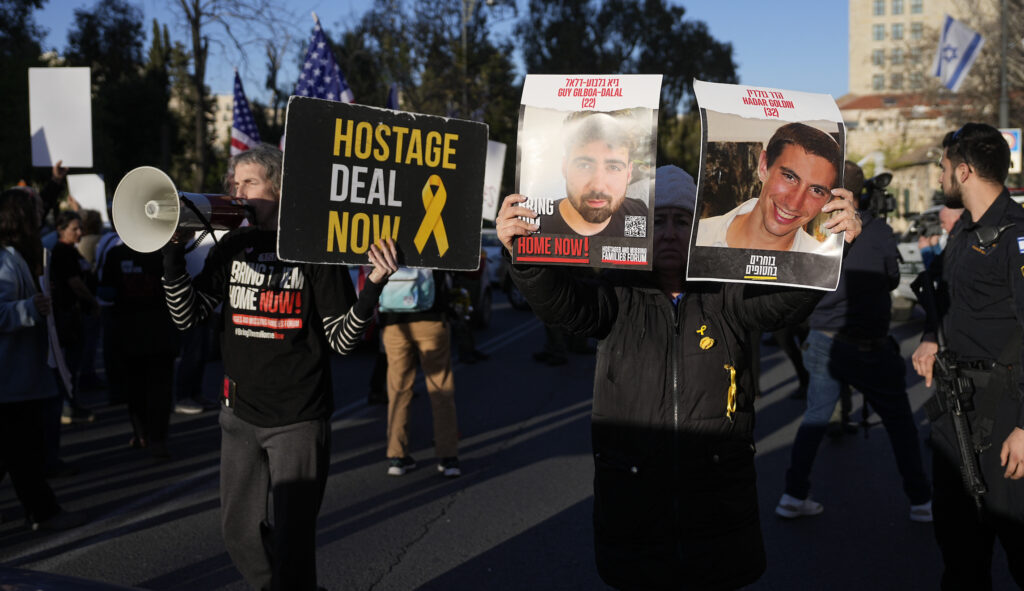Negotiators from mediating countries are continuing their efforts to secure a ceasefire agreement between Israel and Hamas ahead of the Muslim holy month of Ramadan, which begins next week.
U.S. officials have said in recent days that Israel has effectively agreed to the framework of a deal that would include a six-week cessation of fighting and a surge of humanitarian aid in exchange for the release of the hostages, most vulnerable first, held by Hamas. A deal may also include the release of Palestinians being held in the Israeli prison system. Those U.S. officials have said the onus is now on Hamas to respond, though the terrorist group has claimed Israel is the side that has refused to meet their demands.
Hamas said in a statement on Wednesday that it has “expressed the required flexibility with the aim of reaching an agreement that stipulates” a permanent ceasefire, the withdrawal of Israel troops from the Gaza Strip, the return of displaced Gazans to their homes in the north and “provisions for the needs of our people.”
The mediators — the U.S., Qatar, and Egypt — have sought to get a deal in place before Ramadan, which will begin this Sunday. Negotiations have been ongoing for months dating back to the only ceasefire agreement that has taken effect, which lasted for a week in late November and allowed for the release of more than a hundred hostages.

Israeli government spokesman Avi Hyman said on Tuesday that the government had put its “cards on the table” and has “stated very clearly what we need.” One Israeli request that has become a source of contention is that Hamas has to provide a list of hostages who are still alive.
“We’ll know in a couple of days what’s going to happen,” President Joe Biden told reporters on Tuesday. “There’s got to be a ceasefire. If we get to [the] circumstance that it continues to Ramadan … it’s going to be very dangerous. So we are trying very, very hard to get a ceasefire.”
With Ramadan set to begin in days, the Israeli government decided against imposing new restrictions regarding access to the Aqsa Mosque in Jerusalem. The mosque has frequently been the site of tension in recent years.
Itamar Ben-Gvir, Israel’s hard-right security minister who has been known for his anti-Palestinian stances, disagreed with the decision, posting on X, “Hamas celebrations on the Temple Mount ≠ complete victory,” using the name used by Israel to refer to Aqsa.
Ben-Gvir’s frequent anti-Palestinian rhetoric has raised concerns by the U.S. and other Western countries due to his suggestions for what Gaza should look like after the war. He has advocated an incentivized forced displacement of Palestinians from Gaza, while Israeli Prime Minister Benjamin Netanyahu’s office has discussed a 10-year plan to complete its war efforts and establish and stabilize a new government, according to the Times of Israel.
A top member of Israel’s war Cabinet, Benny Gantz, has been in Washington, D.C., this week meeting with U.S. officials including Vice President Kamala Harris, Secretary of State Antony Blinken, Secretary of Defense Lloyd Austin, and Biden’s national security adviser, Jake Sullivan.
Gantz’s visit, which has ruffled Netanyahu’s feathers, seemingly demonstrates the growing divide in Israel’s government. They belong to different Israeli political parties but Gantz joined Netanyahu’s emergency war Cabinet.
U.S. leaders pushed Gantz to do more to allow desperately needed humanitarian aid into Gaza due to the growing crisis.
“Secretary Austin condemned Hamas’ attack against Israel on October 7 and called for the release of all hostages held by Hamas,” Pentagon spokesman Patrick Ryder said in a readout of the call. “The Secretary expressed strong concerns over the humanitarian situation in Gaza and requested Minister Gantz’s support in enabling more humanitarian assistance and distribution into Gaza. The Secretary emphasized the critical need for a credible and implementable plan for protecting civilians and addressing the humanitarian situation prior to any ground operations in Rafah.”
The U.S. has pushed Israel for months to do more to prevent civilian casualties and allow more assistance to aid them as the humanitarian situation has worsened.
U.S. military operators have conducted two humanitarian airdrops in recent days where they dropped more than 70,000 meals. They have discussed the possibility of using maritime resources to provide additional aid to the strip.
CLICK HERE TO READ MORE FROM THE WASHINGTON EXAMINER
The World Food Program said in a statement on Tuesday that a 14-truck convoy carrying food for Palestinians located in northern Gaza was turned away by the Israel Defense Forces at the Wadi Gaza checkpoint. The convoy was rerouted and was later stopped and looted by desperate individuals.
“Airdrops are a last resort and will not avert famine. We need entry points to northern Gaza that will allow us to deliver enough food for half a million people in desperate need,” Carl Skau, WFP’s deputy executive director, said.
Hunger has reached “catastrophic levels,” the WFP said in its statement.
